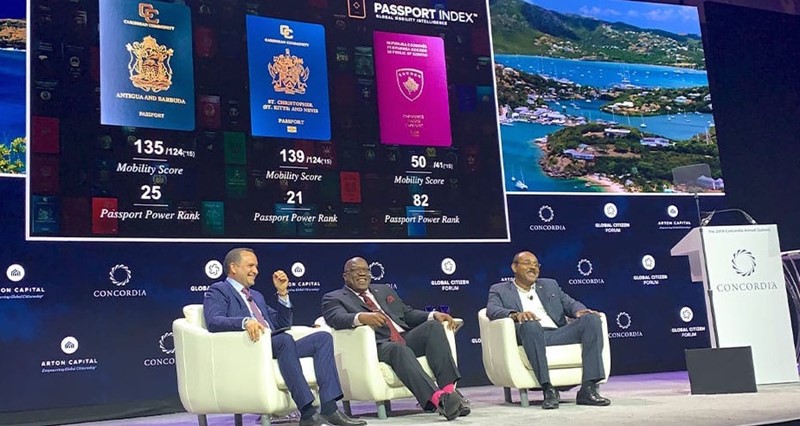
A roundtable in New York on Tuesday September 24th on ‘Best Practices and Industry Tendencies in Investment Immigration,’ hosted by Arton Capital, heard from a number of leading players, that small island states should continue to collaborate to keep citizenship programs strong and free from criticism.
Ambassador Gilbert Boustany, Consul General in Miami to Antigua & Barbuda, said that citizenship-by-investment programs were essential to the economies of the Caribbean.
“CBI helps us provide opportunity for our citizens,” he said. “It takes them from poverty to the middle class. Last year Antigua made more than US$100 million from its program. If that money was stopped, how could we replace it?”
The aim, according to ambassador Boustany, is to make sure that industry players communicate and collaborate better. “We should regulate our own niche industry.”
The roundtable, moderated by Armand Arton, founder and president of Arton Capital, aimed to identify the benefits of immigrant investor programs, encourage best practices, assess compliance and due diligence, and highlight the responsibility of stakeholders.
“These programs are a boon to the countries, and a benefit to individuals who otherwise are restricted solely by an accident of birth,” said Mr Arton. “Security and due diligence is very important, and it is important that agents focus on who they are selling to.”
Thomas Anthony, the former head of Grenada’s Citizenship-by-Investment unit, gave an overview of the market, pointing out that when the global financial crisis hit in 2008, foreign investment dried up for the region. The governments of Antigua & Barbuda, Dominica, Saint Lucia and Grenada, having observed the success of the Saint Kitts & Nevis program, separately launched their own programs. 
“For Antigua & Barbuda, CBI has been a huge success,” he said. “There are now more than 40 real estate projects. It is a similar story in Grenada, which has recently moved to encourage the development of 5-star branded hotels, including attracting the Kempinski Group and Six Senses to the island.
Francene Baron, Minister of Foreign Affairs of Dominica, which last year processed more than 2,000 applications, said that its program really took off in 2014 when the country acquired visa-free entry to Schengen countries, and increased its marketing efforts.
Kim Marsh, with more than 35 years’ experience in law enforcement and now a special advisor to Arton Capital, said that getting the right processes in place is essential for any successful program, and countries should work together to keep out undesirable elements.
“I can safely say that I’ve seen more than 20,000 files in my time, and I’ve yet to see one that appeared to be from a terrorist, they can’t stand the scrutiny and don’t want the transparency or exposure that you get from these programs.”
However, some speakers felt that more should be done to encourage countries to work more closely together. “There has been progress in the Caribbean in some regards, particularly when an applicant refused by one country used to apply to another,” said ambassador Boustany. “That has been stopped.”
Armand Arton pointed out that this industry collaboration should go wider than the Caribbean, to include Vanuatu and the Solomon Islands when their program launches.
On the question of due diligence, there was universal agreement that great strides have been made, though more can be done. One issue is the delay that still exists.
“Banks should not waste valuable time repeating due diligence that has already been done by independent companies. We understand why they do this, because they fear reprisals and heavy fines if anything goes wrong. However, perhaps one solution is for the countries, assuming they are satisfied by their due diligence processes, to indemnify the banks from the risk.”
Eric Schultz, former US ambassador to Tanzania and now an advisor to Arton Capital, gave the perspective of the United States. “The US is neither for nor against these programs,” he said. “But they are concerned that they are managed properly, so the stakes are high, if you are going to do a program, do it right. But let’s not forget the US has its own investor immigration scheme, the EB5. Many other countries, including the United Kingdom, Malta, Greece and Cyprus run their own schemes, so it would be hypocritical of them to be too harsh on other countries doing the same thing.”
Armand Arton said that a passport is much more important than a mere prosaic travel document. Mobility is now a key component of good leadership, and encourages citizens to travel but also to invest in their own countries. The Passport Index, which monitors the visa free agreements in the world, shows that contrary to expectations, the world is continuing to open up, at about 3-4% growth rate. “If it continues at this rate to 2050, every citizen will be able to travel visa free to every country,” he said, “and I’ll be out of a job. However, my children will inherit a world where mobility is available to everybody, so it will be worth it.”


